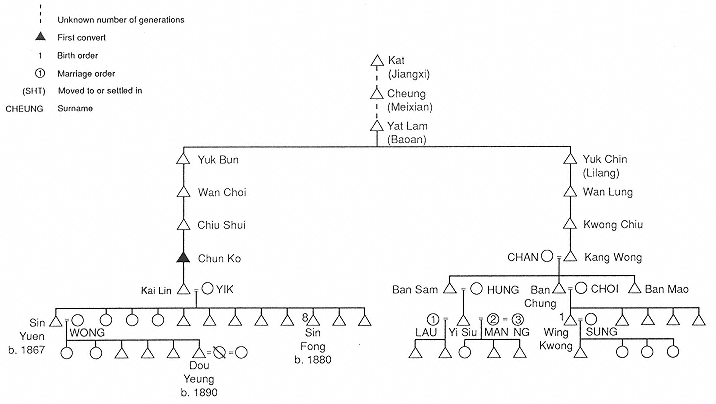Ling Kai Lin (see fig. 2)
There are several sources on the history of the Ling family, the most detailed of which was written by Ling Sin Yuen, the eldest son of Kai Lin, and is included in the Pang volume (see Pang 1934; Luo 1965; Lin[g] 1974). Some relatives of Ling Kai Lin in Hong Kong provided helpful information, and I was also able to obtain several articles about the family written by Lin[g] Dou Yeung, the son of Ling Sin Yuen.[1] Although he lived in the United States, Ling Dou Yeung was still an elder of Shung Him Church in 1987.
Ling Sin Yuen begins his family history by recounting the belief that if a person does not know his ancestors he will be worse than an animal, and that one should trace his family history as far back as possible. He traces the Ling history back to Kat in Jiangxi province, Cheung who moved to Meixian in Guangdong province, and Yat Lam who moved to Buji, Baoan. Ling Kai Lin is the fifth-generation descendant of Yat Lam; the first four were Yuk Bun, Wan Choi, Chiu Shui, and Chun Ko. Chun Ko was the father of Kai Lin. Chun Ko was a "simple and honest" person who "worshiped idols" until he was forty, when he learned of Christianity from the Basel missionary Hamberg.

Figure 2.
Ling Genealogy.
He then "left the idols and became devoted to the true God. He and his family were baptized and became Christians" (Pang 1934:39).
However, hatred of Christianity grew among the villagers and Christians suffered persecution. The missionaries were expelled from the village, so they left for Lilang, where they established a school and taught the Bible. Kai Lin entered that school and after graduation went with his wife to Zhangcun in Wuhua, where he worked for twelve years. Later, concerned for his parents because he had no brothers who could take care of them, Kai Lin applied to return to his native village. He wanted to "look after his parents and fulfill his duty as a son" (Pang 1934:40). His application for a transfer was approved, but when he reached home the plans had been changed and he was sent to Chang Shan Kou. At that time he wrote the following poem expressing his sadness at leaving his parents, and his commitment to his calling:
Just as I unload my saddle at my native village
Then I must lead my horse to Chang Shan.
If not to spread truth and obey divine orders,
How could I leave my home and my father's face?
According to Ling Sin Yuen, Kai Lin's aspiration to sacrifice himself to others and transform his filial piety into loyalty to God was clearly revealed in the poem (ibid.).
Kai Lin stayed in Chang Shan Kou for three months and then was sent to Guzhu, where a new church was being built. After living there for six years, he went back to Lilang, where he devoted himself to the church for another thirty-six years. In the words of Sin Yuen, Kai Lin raised his children and worked for the church, endured hardships, and spared no effort in performing his duty. At fifty-seven he retired and returned home, but his passion for helping others never left him. He raised enough money to build a church and school in his village, but he was not happy there because it was not a peaceful place. He "founded" Shung Him Tong in 1903 and thereafter enjoyed a peaceful life in Lung Yeuk Tau, returning to his native village only for visits. In 1918, at age seventy-four, he returned to his native place, where he died and was buried. His wife (surname Yik) died in Shung Him Tong at the age of ninety in 1932 and was one of the first people to be buried in the Shung Him Tong cemetery.